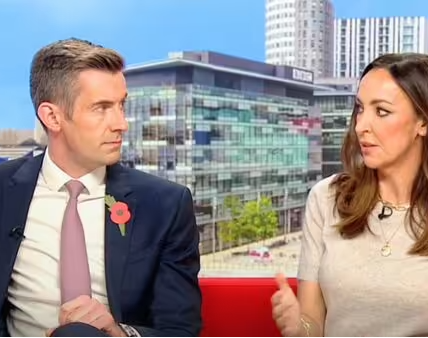Britain is living beyond its means. So could we go bankrupt?

Chancellor Rachel Reeves has lost her grip – could Britain go bust? (Image: Getty)
It looks that way. National debt now stands at £2.9trillion, close to the size of the entire economy, up from roughly 35% of GDP in 2008 after the financial crisis. The TaxPayers’ Alliance calculates that total liabilities, once public-sector pensions and PFI obligations are included, exceed £12trillion.
Chancellor Rachel Reeves said she inherited a £22billion black hole from the Tories. She’s potentially doubled that to £40billion. She’s set to borrow another £150billion this year, and risks driving the UK into a fiscal doom loop by whacking up taxes again in the Budget.
Yet some economists scoff at claims that Britain can go bust. They point out that we issue our own currency, so can always print money to meet our obligations.
That’s true in a technical sense, but money printing would wreck our fiscal credibility and turbo-charge inflation. And do we really want to turn into Argentina?
We’ve been here before. In 1975 Labour chancellor Denis Healey went “cap in hand” to the IMF. Could Reeves follow in his footsteps?
I asked three economists. One, Ben Ramanauskas at Policy Exchange, warned of a “full-blown financial crisis” unless spending is controlled. So how worried should we be?
Warning lights are flashing, writes Ben Ramanauskas, senior research fellow in economics at think tank Policy Exchange.
“The UK’s public finances are in a dire state and look set to get even worse. The national debt is forecast to top 270% of GDP in the next 50 years. Unless productivity improves, it will explode past 640%.
Our unsound public finances may also drive up borrowing costs, increasing the national debt even further.
This would make borrowing more expensive for people and businesses, putting homes and livelihoods in jeopardy.
Bond market investors may even question whether the UK is able to pay the money back, especially if a new crisis strikes, such as a recession, pandemic or war.
The Government needs to take urgent action. Public spending will have to be slashed, especially on out-of-work benefits. It also means scrapping the state pension triple lock, which has become unaffordable.
Even more importantly, we must slash red tape and build homes, energy and transport infrastructure, to get the economy growing again.
While fears of an IMF bailout are overblown, Rachel Reeves needs to get a grip. It’s the only way to avert a full-blown economic crisis.”

Ben Ramanauskas of Policy Exchange: the national debt could explode (Image: Policy Exchange)
Britain risks a fiscal doom loop, writes Tom Clougherty, executive director of free market think tank the Institute of Economic Affairs.
“Ernest Hemingway famously wrote that bankruptcy happens two ways: gradually, then suddenly. That could apply to Britain.
The UK budget hasn’t been balanced since the start of the millennium. We are borrowing more than £300million daily, yet we’re not at war or in a pandemic.
Among advanced economies, we have the third-highest deficit and borrowing costs, and fourth-highest total debt.
There’s the risk of a fiscal doom loop: rising debt leads to higher borrowing costs, which widen deficits, and pushes debt even higher. Once established, that cycle is hard to break.
As the population ages, rising demand for pensions, healthcare and social care will dramatically increase public spending.
We’d need to double income tax over the next 70 years to pay for it.
So wre we on the verge of a full-blown debt crisis? Here, I’m less convinced. Countries that borrow in their own currency can ultimately print money to pay the bills.
The resulting inflation can be extremely damaging, even disastrous, but it’s not the same as going broke.
Our fiscal situation is a choice. We do not have to live beyond our means, either now or in the future.
Public spending doesn’t have to be 44% of GDP, at a time when tax revenue is only 37% (already a historic high).
With public understanding and political will, Britain’s fiscal fortunes can be turned around.
This requires an ambitious pro-growth agenda to boost the private sector, alongside a rigorous plan to curb government spending.
It won’t be easy, but it can be done.”

Tom Clougherty at the Institute of Economic Affairs: bankruptcy can happen suddenly. (Image: IEA)
Don’t panic, writes Will Ellis, senior economist at the Institute For Public Policy Research.
“No, Britain is not going bust. Our national debt nearing 100% of GDP might look alarming, but the UK is tackling long-term challenges head-on.
Look abroad and Britain does not look like the weak link. Our debt-to-GDP ratio is comfortably below the US at 121%, France (113%), Italy (135%) and Japan (237%).
After the Second World War, the national debt soared above 250% of GDP. Yet it fell steadily fell, helped by high growth.
The cost of servicing debt is predicted to be stable. Recent interest rate spikes will ebb.
Investors are still eager to lend to the UK, with gilt auctions oversubscribed.
The IMF’s most recent assessment concluded that the UK “appropriately supports growth while safeguarding fiscal sustainability”.
The UK borrows in its own, floating currency and has a credible, independent central bank. This is not a country heading for an IMF rescue.”
My verdict: The IMF couldn’t afford to bail us out, even if we asked. The UK economy is simply too big.
But it could give our terrified politicians the cover they need to force through painful spending cuts.
Even if Britain can’t technically go bankrupt, we face a lot of pain unless Reeves brings UK finances back under control. I don’t think she can. Hold onto your hats!

Will Ellis at the Institute For Public Policy Research: no IMF rescue required (Image: IPPR)
